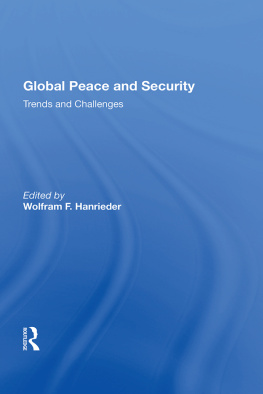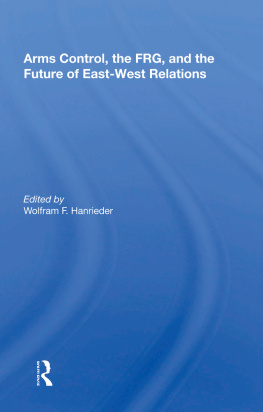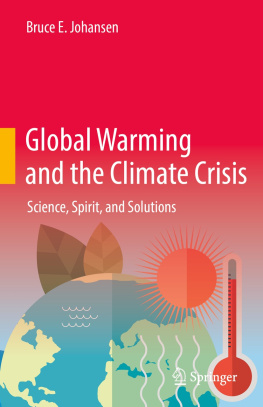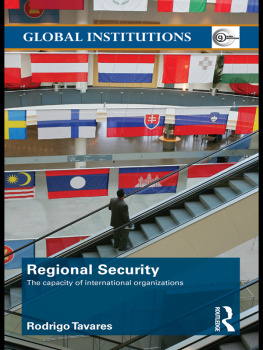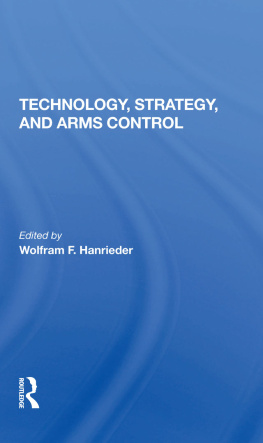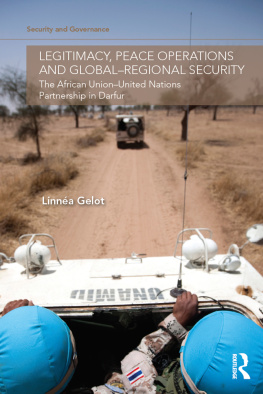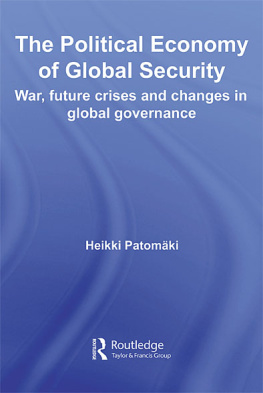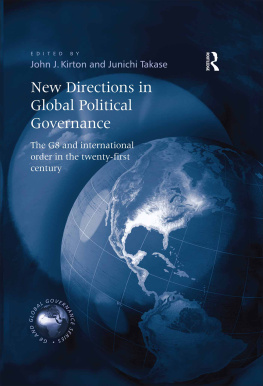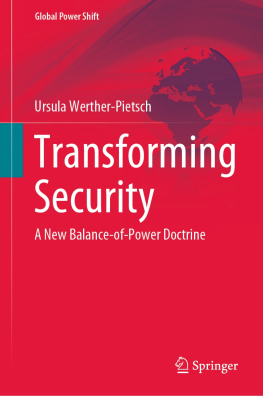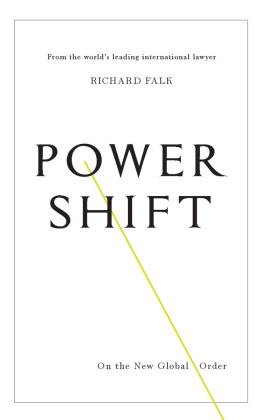Global Peace and Security
About the Book and Editor
Focusing on the social, economic, and political structures of the postwar global order, this collection of essays discusses the search for a new international economic order, the transformation of the nation-state and the international balance of power, the technological and strategic dimensions of the nuclear age, East-West trade and technology transfers, and the moral and political challenges posed by the quest for a more stable and just world order. Together these original essays provide an overview of the possibilities for and limitations of providing political direction in a global system characterized by social, economic, and technological change.
Wolfram F. Hanrieder is professor of political science at the University of California, Santa Barbara. He is editor of Technology, Strategy, and Arms Control (Westview, 1986).
First published 1987 by Westview Press
Published 2018 by Routledge
52 Vanderbilt Avenue, New York, NY 10017
2 Park Square, Milton Park, Abingdon, Oxon OX14 4RN
Routledge is an imprint of the Taylor & Francis Group, an informa business
Copyright 1987 by Taylor & Francis
All rights reserved. No part of this book may be reprinted or reproduced or utilised in any form or by any electronic, mechanical, or other means, now known or hereafter invented, including photocopying and recording, or in any information storage or retrieval system, without permission in writing from the publishers.
Notice:
Product or corporate names may be trademarks or registered trademarks, and are used only for identification and explanation without intent to infringe.
Library of Congress Cataloging in Publication Data
Global peace and security.
Includes bibliographical references.
1. Peace. 2. Security, International.
3. International organization. 4. International
economic relations. I. Hanrieder, Wolfram F.
JX1952.G538 1987 327.09048 86-28289
ISBN 0-8133-7289-5 (alk. paper)
ISBN 13: 978-0-367-01205-2 (hbk)
Contents
, Elise Boulding
, Richard A. Falk
Immanuel Wallerstein
, Johan V. Galtung
, Wolfram F. Hanrieder
, Robert M. Cutler
, Thomas L. ligen
, Lawrence Badash, Elizabeth Hodes, and Adolph Tiddens
, Sanford Lakoff
, Graeme P. Auton
This anthology, like the previously published companion volume (Wolfram F. Hanrieder, ed., Technology, Strategy, and Arms Control [Boulder, Colo.: Westview Press, 1986]), is based on lectures delivered at the University of California. Santa Barbara (UCSB). These lectures are part of the newly established Program on Global Peace and Security, through which UCSB seeks to augment its existing academic programs with a public dialogue on some of the most pressing problems that stand in the way of achieving a more peaceful and just world order. The primary purpose of this program is to enable our undergraduate students to complete their formal major by pursuing an organized plan of study concerning global peace and security issues and to help them examine these issues from a variety of perspectives-from different academic disciplines, from different political orientations, and from the points of view of different parts of the world. Beyond that, the program aims to reach a wider audience-on and off campus-and foster the reasoned discussion of problems that affect, directly or indirectly, our daily lives and local communities, although their origins and possibilities for solution may be distant in both time and place. Arranging for a series of public lectures and publishing the essays that resulted from them are parts of this effort.
There is no reason to believe that the issues addressed in last years anthology-nuclear and conventional war, the technological and political dynamics of the arms race, the moral and analytical ambiguities of national security policy-are any less urgent this year. But from the very beginning of the Program on Global Peace and Security we did not intend to define the issues of peace and security in a narrow way. War, whether international or domestic, is the most extreme and dramatic form of organized conflict. But the roots of war are to be found not only in the infirmities of human nature but also in the social, economic, and political structures that shape human conduct. These structures, having grown over time, are resilient even though they may be obsolescent, resistant to change even though they must accommodate it. These large and fundamental forces and their effect on human aspirations are what we sought to illuminate, hoping to demonstrate that the inequities reflected in them are at the root of issues which, if not resolved, lead to violence and war.
It is a pleasure to acknowledge the generous support that the Program on Global Peace and Security has received from Provost David Sprecher, UCSB, and from Professor Herbert York, University of California, San Diego, director of the University of California Institute on Global Conflict and Cooperation. Our students at UCSB, for whom this program is intended, are also the ones to whom this anthology should be, and is, dedicated.
Wolfram F. Hanrieder
Santa Barbara, California
Global Peace and Security
1
Learning Peace
ELISE BOULDING
What does it mean to talk about learning peace? It is now generally accepted in learning theory that we can only learn something that we know already. That means the existing cognitive structures have to be compatible with the new information, and an experience base has to exist for connecting the new information with what is already known. When new information is to be introduced that is incompatible with existing cognitive structures or contradicts previous experience, then groundwork has to be very carefully laid in order that the new information can be assimilated.
One problem that people in the peace education field face is that cognitive structures in the target audiences for peace education are usually organized to support win-lose thinking, a we-they attitude toward any potential adversary. These attitudes are buttressed by a social experience of competitive struggles to win in every setting from the classroom and playground to the economic and political arenas. To shift from zero-sum-game to positive-sum-game thinking and from a drive to dominate to a drive to cooperate requires more than imparting information about new approaches. It requires the construction of new mental maps about reality and a reexperiencing of that reality by the learners in ways that are intuitively convincing to them.
Much of peace education leaves cognitive structures and everyday experience untouched. Even though peace education as an acknowledged educational effort involving the preparation of curriculum materials has existed for over a century, nations have gone to war repeatedly during that century and today live in the dread of a nuclear war that to many seems inevitable.
It is now becoming clear that peace education has not resulted in learning peace. The longing for peace remains but is unconnected to how people think the world really works. Yet there are promising developments in peace education that involve precisely experiential learning and offer hope for the development of a less combative, more problem-oriented approach to international conflict on the part of adversary nations in our time. There are possibilities, not so much for transcending violence as for transforming, or reforming, violent behavior toward actions that will produce genuinely attractive social outcomes for the participants in conflict. This chapter will consider some of these developments.

